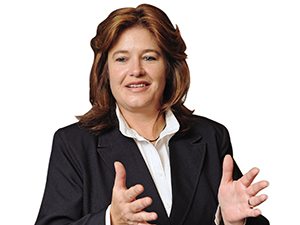
[miningmx.com] – KEATON Energy may not pay a maiden dividend for its 2014/15 financial year as promised six months ago judging by the response of CEO, Mandi Glad, to a Miningmx question. “No comment,’ she said when asked if money was too tight to mention.
As it stands, Keaton is reasonably well capitalised.
At the interim stage in November, the company increased net cash flow to R113m from R70m year-on-year. It also cut net debt to R271m from R324m previously – no mean feat considering how poor the coal market was last year, especially for small cap players.
Unfortunately, the coal market has deteriorated further since Keaton’s interim results.
Selling material to Eskom – which Keaton does from its Vanggatfontein mine in Mpumalanga province – is steady business owing to medium- to long-term contracts, but Keaton has some international exposure through its Vaalkrantz colliery, a geologically challenged that sells metallurgical coal to Brazil, among other destinations.
It also suffered the effects of stock theft from its Vaalkrantz operation, a development Glad described as “horrific’. “It’s not something you expect from within your own [Keaton] family,’ she said.
More importantly from a strategic point of view, however, is the fact that Keaton has some hefty capital expenses on the horizon.
It is building the R300m Moabsvelden project in Mpumalanga province and said in November that it expected to make an investment decision on the larger R650m Braakfontein property, also in Mpumalanga province, at the mid-point in the calendar year.
The two projects will add three million tonnes a year of coal production and catapult Keaton into the mid-tier coal producing category, but they will also stretch the balance sheet at a time when business environment is depressed and bank terms trickier to negotiate than usual.
It’s possibly owing to the tight business conditions that is also persuading Glad that she needn’t push hard on a coal sales agreement for material from Moabsvelden to Eskom.
“We have agreed on volumes and the product; we just haven’t agreed on price and we’re not pushing it hard because we want to get a good price from Eskom,’ said Glad.
Playing the waiting game with Eskom is likely to be a position most new suppliers will adopt.
Eskom has a well publicised coal supply deficit which it said would kick in about 2018; it is, therefore, something of a price-taker. However, Glad also alluded to other factors influencing the CSA related to black economic empowerment (BEE).
“We will have to seriously look at the CSA for the BEE conditions,’ she said. “I can’t yet say if we will have a condition that allows us two years to get to the required BEE levels, or not.’ In terms of new regulations for coal suppliers to Eskom, the supplier has to be 50% plus one share empowered which is proving a headache for most companies.
Then there’s the likelihood that Moabsvelden may be delayed owing to a hold-up in the granting of a water use licence from the South Africa’s Department of Mineral Resources. “There will definitely be a delay, but I still don’t believe it will be material’ said Glad.
She acknowleged, however, that the company should have been in development on the project already. Moabsvelden is planned as a 1.4 million tonne per year thermal coal mine and was due to hit full production in 2016.
“We have yet to receive the water licence which comes from the fact that we had to amend the mine works which led to a complete redesign of the project,’ said Glad. Moabsvelden was bought as part of the takeover of Xceed Resources, an Australian company, for R183m in 2013.











